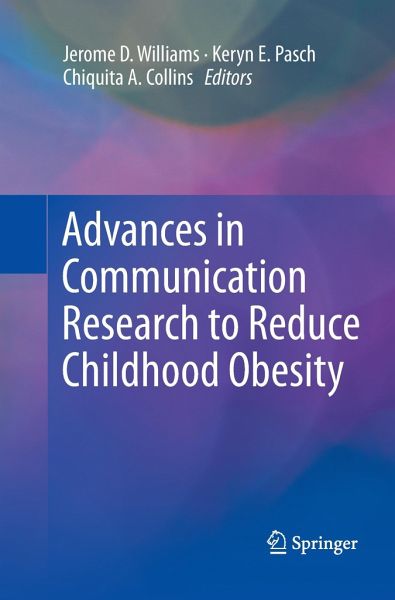
Advances in Communication Research to Reduce Childhood Obesity
Versandkostenfrei!
Versandfertig in 6-10 Tagen
113,99 €
inkl. MwSt.

PAYBACK Punkte
57 °P sammeln!
Rates of childhood obesity are alarmingly high and increasing each year. Studies have shown that obese children are more likely to become obese adults and are likely to suffer with numerous health consequences like coronary heart disease, high blood pressure, and Type II diabetes, among others. Studies also indicate that television viewing and exposure to advertising for food products influences children's attitudes toward, food preferences and food purchase requests for foods with low nutritional value. It is important to better understand the role of media in childhood obesity and to learn h...
Rates of childhood obesity are alarmingly high and increasing each year. Studies have shown that obese children are more likely to become obese adults and are likely to suffer with numerous health consequences like coronary heart disease, high blood pressure, and Type II diabetes, among others. Studies also indicate that television viewing and exposure to advertising for food products influences children's attitudes toward, food preferences and food purchase requests for foods with low nutritional value. It is important to better understand the role of media in childhood obesity and to learn how media may be used to address this issue in a positive way.This book focuses on communication and media research that can have an impact on reducing childhood obesity. Emphasis is placed on topics related to how the media communicate health-related messages about food, nutrition and diet that influence childhood obesity. Particular emphasis is on the new media, given the fact that media now have more central roles in socializing today's children and youth than ever before. Advertising and marketing messages reach young consumers through a variety of vehicles - broadcast and cable television, radio, magazines, computers through the Internet, music, cell phones - and in many different venues - homes, schools, child-care settings, grocery stores, shopping malls, theaters, sporting events, and even airports. In addition, given the disparity in obesity rates between children of color and the general population, special attention is given to research on media targeting these populations.












